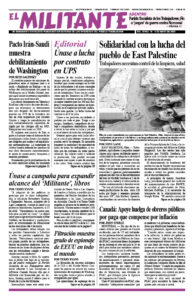MONTREAL — In one of the largest labor actions in Canada in decades, more than 155,000 federal government workers, members of the Public Service Alliance of Canada, set up picket lines from one end of the country to the other April 19 to fight for wage increases to match inflation.
The strikers include firefighters, port workers, maintenance staff and administrative personnel across a number of government departments, as well as 35,000 members of the Union of Taxation Employees, a division of Public Service Alliance, who work for the Canada Revenue Agency.
About 47,000 of the PSAC members deemed “essential workers” by the union and the government, such as those distributing unemployment benefits and pensions, remain on the job. Income tax processing toward the May 1 tax deadline will be affected, as will the issuing of passports and administrative services at ports. Other government services will be halted.
“When you look at the impact of inflation on us, the government offer is a joke,” Jason Meehan told this Militant worker-correspondent on a picket line of several hundred in downtown Montreal hours after the strike began. Meehan, who is participating in his first strike, has worked in the passport division for two and a half years.
One striker held up a homemade sign that said, “Inflation affects everyone.”
Workers everywhere are watching the showdown. In front of the Parliament buildings in Ottawa, striker Samantha Basha told the Ottawa Citizen, “When federal public servants get the wages we deserve, that sets a precedent for private industry too.”
“When the government represses wages of its own employees, what it’s doing is repressing wages for all workers right across the country,” Chris Aylward, president of the Public Service Alliance of Canada, told the Globe and Mail.
Hundreds of unionized nurses, postal workers, educational assistants and others picked up this theme on April 21 in a solidarity march with the strikers through downtown Calgary, Alberta, under the slogan “Workers demand better.”
“There’s a movement in Canada right now, not just in Alberta, where workers are saying we want better, we want better schools, we want better governance, we want better social services, not just at the bargaining table, it’s right across society,” Rory Gill, president of the Canadian Union of Public Employees in Alberta, told the rally.
Anti-union campaign
Since the start of negotiations with Ottawa’s Treasury Board nearly two years ago, PSAC has demanded a 13.5% wage increase spread over three years, which would just cover the current official rate of inflation. The real rate is much higher. In separate negotiations with the Canada Revenue Agency, the Union of Taxation Employees has demanded a 22.5% increase. Ottawa has only offered 9% — in reality a wage cut given inflation — claiming that any more is “unaffordable.”
Another issue involved workers who since the COVID-19 pandemic have been working from home. The government now wants them to come to the office two to three days a week. Workers say there’s no need, since they’re just as productive from home.
The strikers are facing a government and media campaign that claims they are privileged and have no support from other working people. The Bank of Canada claims workers’ hourly wage increases of about 5% year-over-year are “not compatible” with bringing inflation down to its 2% target.
On April 21 the National Post and Globe and Mail ran articles saying a complaint by a union member led the federal labor board to claim only a third of the Public Service Alliance of Canada membership participated in the strike vote and that there were “major irregularities.”
Federal workers union leader Aylward dismissed the attack. “The broad support for our strike mandate amongst the membership can be seen in real time on hundreds of picket lines throughout the whole country this week as over 100,000 members showed up to pressure this government to reach a fair contract for Canada’s public service workers.”
“Our unions need to build countrywide solidarity with the Public Service Alliance strike and counter the bosses’ lie that wage increases cause inflation,” Félix Vincent Ardea, Communist League candidate in the upcoming federal by-election in the Montreal electoral district of Notre Dame de Grace, told the Militant April 21. Vincent Ardea is a train conductor and member of the Teamsters union at Canadian National Railway.
“Wage increases don’t cause anything except a reduction in the profits of the employers. This is why Ottawa, acting in the interests of the capitalist class, is resisting the federal workers’ wage demands,” he said.
“And this is why the strikers are right when they explain that if they win what they need and deserve, other workers will be in a better position to fight for wage increases that keep up with inflation.”
Prime Minister Justin Trudeau refuses to rule out use of the kind of strikebreaking legislation his government used against strikes of postal workers and Montreal port workers and to threaten striking rail workers since his election in 2015.
Go to the Public Service Alliance of Canada website to find the picket line nearest you and go with friends, relatives, and co-workers! Bring the solidarity the federal government workers need to win!


